Everquest was my first massive multiplayer online roleplaying game, or MMORPG for short. I was aware of the world of Multi-User Dungeons and Ultima Online, but it was Everquest that swept me into the genre. From there, I became obsessed with anything online RPG-related and started to branch out to other games such as Dark Age of Camelot, Asheron’s Call, and Anarchy Online. It was also part of my daily ritual to visit the Lum The Mad website. Like many online RPG geezers, my journey stopped with World of Warcraft. My fascination with the genre ended with that game, but I will not forget the memories.
It might appear that I’m trying to establish myself as an authority on the topic, but that wasn’t my intention (okay, maybe a little bit). After playing Testament, I can tell that designer Yasushi Kuroda is a massive fan of MMORPGs and, based on the logo, a fan of the Final Fantasy series.
Usually, when we think of an online RPG game, we think of a character that levels up by doing quests, killing monsters, and getting loot. Testament doesn’t focus on that area at all. Instead, it’s leaning on the end-game content, more specifically, the raiding.
Nostalgia trip
What is a raid, you might ask? When players reach the maximum level of an online RPG, they need some sort of incentive to keep them engaged. This is where end-game loot comes in. Getting the powerful loot requires you to face tough bosses that force you to know the game well. It was these fights where you were at the bottom of the power totem pole, and if you weren’t careful, you would get hit harder than a truck in an Isekai anime.
Six bosses are thrown at you in Testament to emulate these challenging battles. Armed with a party of four characters with their own abilities and some skill cards, you and your friends go through each boss one by one in a campaign-style game. As an alternative to this kaleidoscope of boss fights, Testament also has rules if you want a one-shot encounter with a particular boss.
Okay, an RPG setting mixed in board games, which means dungeon tiles and miniatures, right? No. This is a card-driven experience, and the board’s purpose is to keep track of specific elements.
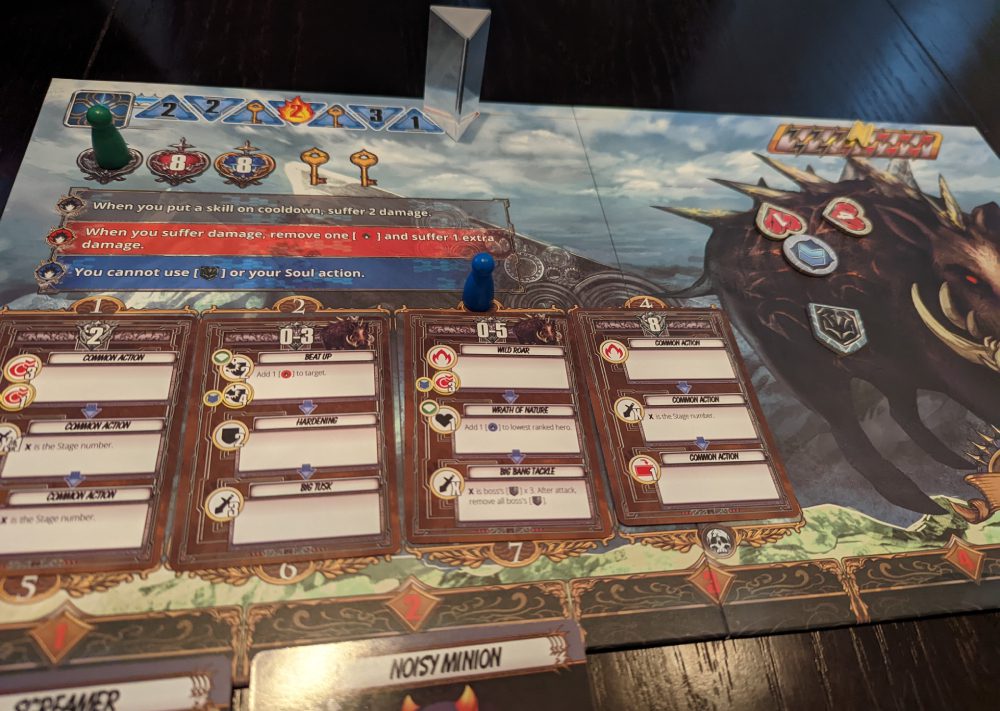
Blue brick road
One of those elements is your party’s progression towards the boss. At the top left corner of the board is a line of blue spaces, symbolizing your journey through the wilderness or dungeon towards the boss. Each round, your party moves one space on the track. I won’t explain what every space type does, but for the most part, you will be drawing minion cards and putting them in the minion row at the bottom of the board. If you ever reach the end of this blue line, the boss shows up, and the fight gets more serious.
Fighting the minions, or doing your actions, is a straightforward affair. You have some skill cards in front of you, you pick one, do the funny text, and turn it sideways to show that it’s exhausted. These cards are very simple, like deal damage or gain a token. Don’t expect something out of Magic the Gathering or Yugioh here.
If you end your turn with all of your cards exhausted, they turn back to normal, and you continue. However, if you start your turn with your cards already exhausted due to enemy abilities, you skip your turn, and you’ll find quite quickly how painful that can be.
Most of these skill cards do what you expect such as healing and dealing damage. Many of them will give tokens. Defensive tokens are what you think they do, as they reduce incoming damage. Buff tokens are a resource a character can use to empower skill cards when activated, while Debuff tokens are used to remove certain abilities from the enemy or the boss itself.
Taunt tokens are the ones you need to watch out for. Specific skills will generate Taunt tokens and the enemy, for the most part, will attack the character with the most Taunt.
After every character has done their turn, the enemy does their actions followed by a boss attack. No dice rolling here. That’s an entire turn.
Production difficulties
This game is not a complicated beast. A round is simply moving up on the blue track, your party does their actions, the enemy does their actions, and the boss does their final bit. Going through a round of Testament doesn’t feel like you are being held hostage by an excel spreadsheet. There is a bit more than how I’m describing it, and this would be the part where I say “go read the rulebook” as an unsubtle hint that not every review needs to spew out every detail of the game but…
The rulebook is bad.
No jokes, no metaphors, no comparisons. It’s just bad.
I’m surprised that I have to write about this because this isn’t my first rodeo with Japanime Games. I have reviewed some of their games like Cowboy Bebop: Space Serenade and Alicematic Heroes. Both games that I enjoyed and had amazing rulebooks, so what’s wrong here? Unfortunately, plenty.
A few aspects of the game are explained vaguely, like red cards being called melee cards and the Mage’s passive ability. Some of the game’s descriptions are too wordy or feel like they’re loosely translated. There is even a major rule in the mob deck game setup that is completely different from the original Japanese rulebook. Anyone outside of the hardcore gaming circle would have difficulty comprehending this book.
As if this wasn’t bad enough, there are numerous issues with misprinted components, such as wrong text on the cards. While I’m writing this, Japanime Games announced that they are sending out errata packs to Kickstarter backers. I did not get a review copy, and I wasn’t a Kickstarter backer. I bought this used from someone, meaning I have to contact them and hope they send me the errata pack. (Update: They threw the errata pack in the garbage. Japanime Games did send me the errata pack along with a review copy of Tokyo Sidekick.)
I’m going through all of this effort because this is one of my favorite cooperative games, and I don’t even like cooperative games.
No, I’m underplaying it. This is one of my favorite games that I have played in the past year despite the production hiccups.
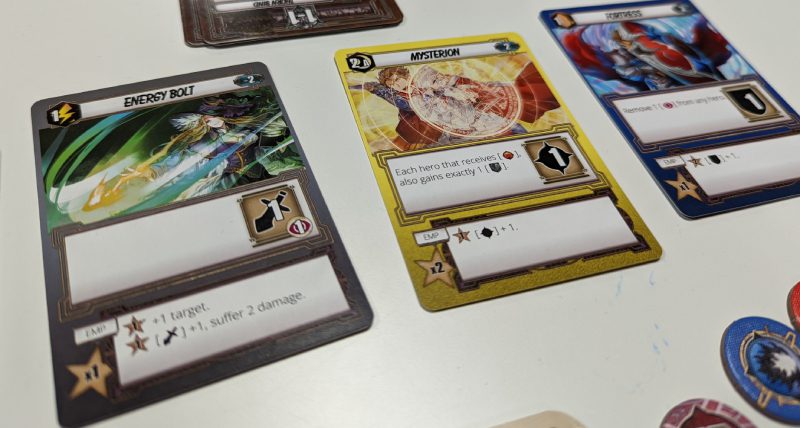
Not usually my jam
Cooperative games are usually not my slice of bread because of their highly random nature. Many of them revolve around a system where you draw a card that tells you that bad things are happening, and you must figure out a way to downplay the result while steering towards the objective. This type of system is all over the cooperative genre like acne on a teenager, and it’s hard for me to be impressed by such a game nowadays.
Testament dropkicks this notion out of existence and gives you and your friends all the power in the world to make their decisions.
Because all of the skill cards have a fixed outcome, you will always know the effects of your actions. Even though the minions are drawn blindly from a deck of cards, your party gets the first move, and the minions’ consequences are not random. The only obstacles stopping are you are your play-by-play decisions and team build.
Wait, team build? I forgot to mention that all of the skill cards are not character-specific. Every single skill card can be used by anyone, even if it doesn’t make sense, like the Rogue character wanting to heal allies instead of murdering. You will customize your party and don’t be surprised if this becomes an involving discussion with your friends before the fight even starts, which isn’t too far off from the MMORPG experience. Fortunately, it’s only four cards unless you are playing the Healer then it’s five. No deckbuilding silliness here.
To sum up, this is a game that grants you the power to pick your tools for the fight, choose what order you execute them, and give you all the information you need to make your move. But, even with this freedom, it will still deliver a painful experience as if you were being rolled down a hill in an iron maiden.
Surviving the ADDs
One of the ways it will do this is through its minions. Each minion has a set of icons and when it is their turn, you resolve them from left to right. While that sounds good, what makes this interesting are the abilities themselves.
Most of these abilities mimic what your party can do. Besides the obvious damage-dealing, they will also heal each other, remove debuff tokens, force you to exhaust skill cards, and remove your party’s tokens. Because of all these abilities, there will be plenty of dialog revolving around prioritizing targets while the feeling of being overwhelmed and doubt smoke bombs your group.
Now this sounds great and all, but it would be pretty boring if it was just that. This is where bosses come in.
Bosses have eight attack cards, four of which are their own, while the other four are generic. There are three stages for each boss, with each stage having its own set of attacks. Like the minions, they also follow the icon system but now have a text-ability associated with those icons. Hmm…just like our party’s skill cards.
The only mechanism exclusive to the boss is the threat tokens. Tokens come in three types, and their effects are based on the boss. The bosses’ personalities begin to emerge here, such as the Raging Boar who deals heavy damage unless you can debuff it, or the Adamant Colossus, with two insta-kill moves if you are not careful. Although there are helpful hints regarding the bosses in the rulebook, your group will still have to navigate through this typhoon of dangers at every stage by modifying the team build.
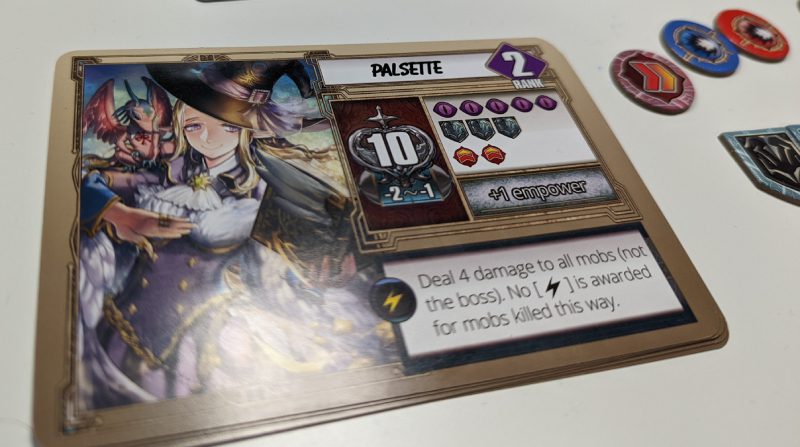
Killing you properly
This is where Testament stands out like a lighthouse during a foggy morning. The game’s difficulty is due to clever design, not randomness, and the challenge springs from using the player’s own rules against them. The best part is that the player gets to make the first move and all of this information is presented to them. Throw in pacing that is so quick that you would assume doping is involved, and you can see why I love this game.
Having said that, I am speaking as an experienced online RPG player first, and a board gamer second. Board gamers have different expectations for their games.
An obvious flag is the character progression or the lack of one in this case. Games like Gloomhaven and the upcoming Isofarian Guard bank on character growth as part of their design. Testament tosses this idea out the window, puts it into a body bag, drives to the closest New York bridge, and throws it into the river. At most, your character progression is coming from upgraded skill cards, and they are more utility-based than number-based, so getting your dopamine from yelling higher numbers isn’t going to happen here.
Not your typical adventure game
This design choice is meant to get your group to focus on the coordination of your party, not get attached to your character as they simply serve as a vessel for your chosen skills. It would have been too much to add complex character mastery to Testament, and it was the right choice for the experience it is trying to convey. Having defeated the first three bosses, I can attest that the game doesn’t get any easier and requires you to interrogate each scenario as if it were a criminal witness.
There is another area of concern that applies to every cooperative game in existence: Alpha Players. With little randomization and all of the necessary information available, there will be plenty of quarterbacking. Unlike most cooperative games, Testament makes the Alpha Player more of a teacher than a dictator since they can easily explain how the scenario will unfold. In addition, as a player of MMORPGs, I can attest that this is an accurate experience since “raid leaders” and “shot callers” do exactly this during online raids. In short, I’m fine with this, but players who despise quarterbacking should be wary of adding this to their online shopping cart.
It would be easy to say this is the perfect difficult cooperative game for me. Unfortunately, I can’t, due to a multitude of production challenges, and I don’t doubt that many players will turn this down due to that. In the cooperative gaming world, it is very rare to find a game that defies conventional game design and does so effectively. Also, it’s hard to make a game that provides a genuinely challenging experience without relying on randomization. Testament pulls off a brilliant magic trick that sadly many people won’t witness due to its unorthodox approach to cooperative design and its difficulty curve being steeper than the K2 mountain. As for me, I have to figure out how to beat the giant metal colossus standing in my way on Stage 3.


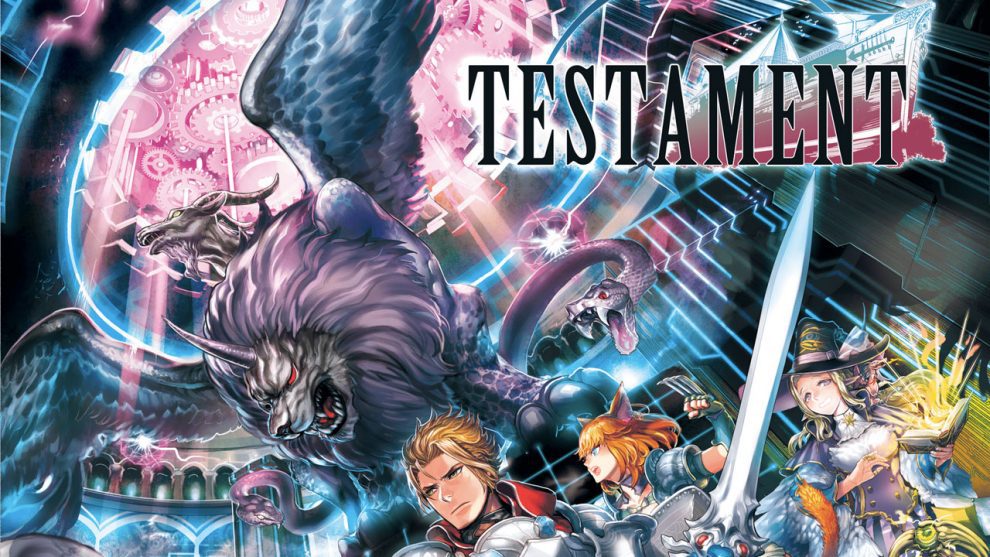

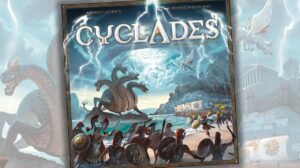

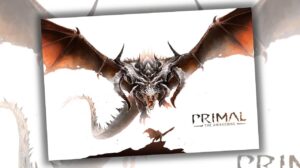
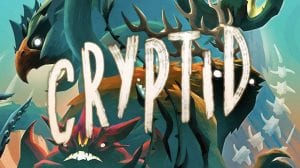




Add Comment